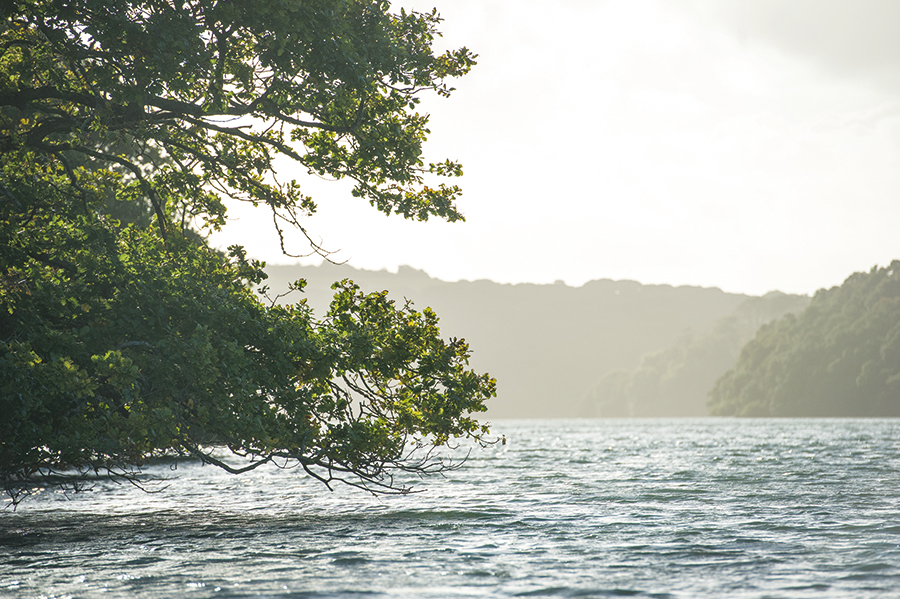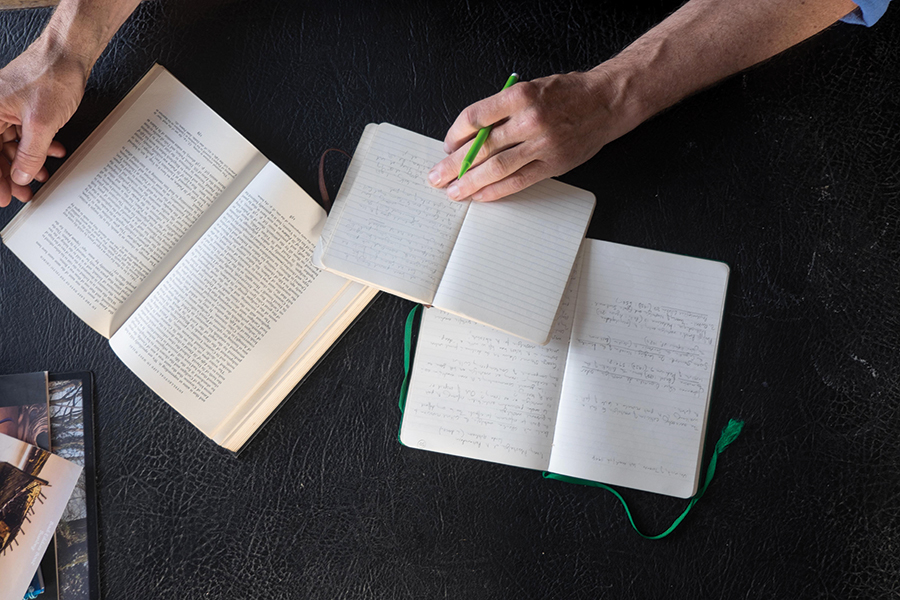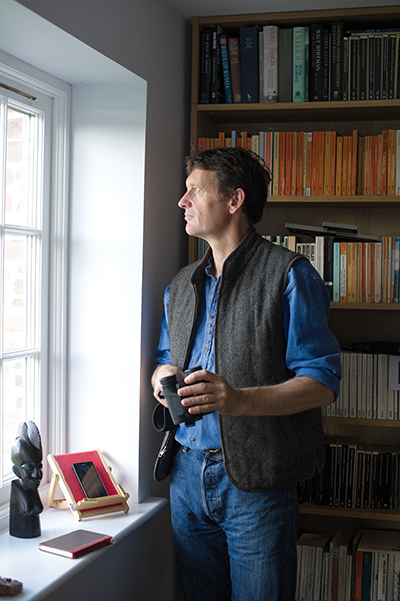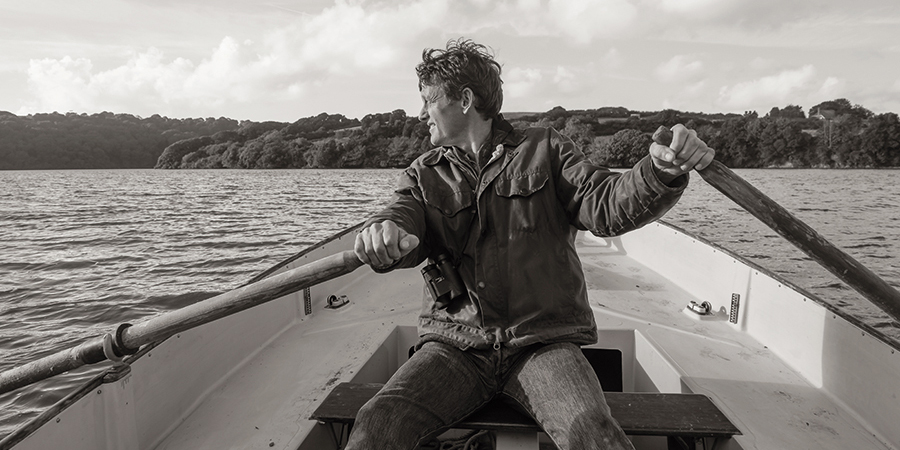Ongoing Quests, Unfinished Stories
Journeys to real and imagined islands
Words: Wyl Menmuir | Photography: Jay Armstrong
Philip Marsden’s writing is deeply rooted in a sense of place. Whether he is writing travel, fiction, non-fiction or fusions of all three, he is engaged in a deep and restless exploration of our complex relationships with the places we inhabit and the landscapes we have traversed throughout history. Midway through a voyage that will culminate in the completion of his current book, he speaks to novelist Wyl Menmuir about engaging in an ongoing quest, revisiting unfinished business and the layers of story, imagination, mythology and nostalgia that are as much a part of a place as its physical features.
Driving down the long track to Ardevora Farm on the Roseland Peninsula, where writer Philip Marsden and his family live, it all feels uncannily familiar. It’s impossible to read his book Rising Ground and come away without a strong sense of the place; in the book, his stories of his travels are punctuated by an account of the process he and his family underwent renovating the farm and his developing love for it. As I approach the house, I begin to appreciate more fully why Ardevora is so special to him. Tucked away in a corner of Cornwall’s Roseland Peninsula in a bend of the tidal upper reaches of the River Fal, the nineteenth-century farmhouse feels protected by the crook of the river’s arm, the rise of the woods on the opposite bank sheltering it further. I can understand why they chose Ardevora, and before I get out of the car I think of the subtitle of Rising Ground, ‘a search for the spirit of place’, and I have a small sense of what that initial overwhelming response might have been when he first laid eyes on the then dilapidated building.

We’d planned to meet on the Cornish coast – it seemed only appropriate given the book Philip is currently writing will be based on a series of journeys by boat in his 31-foot wooden sloop, Tsambika. Just ten days prior to our meeting he’d rounded Malin Head, Ireland’s most northerly point. This completes the first leg of a journey navigating the western seaboard of Ireland and Britain, an area of ongoing fascination for Philip. Eventually, his journey will take him across open sea to the coast of Scotland, from where he will make his way up into the Hebrides. The day we are to meet, however, the rain is firmly entrenched and we settle for the shelter of his writing studio, a small single-storey stone building nestled by the farmhouse. Similar to the farmhouse, Philip’s writing studio, ‘the Writer’s Block’, has its own story attached to it – designed by his father, a retired architect, it was built with locally-quarried Cornish slate and stone with Philip having a hand in its construction.
Much of Philip’s writing has focused on Cornwall, and his recent non-fiction books Rising Ground and The Levelling Sea and his novel The Main Cages are deeply rooted in the region he and his family have made their home. He has also written extensively on Ethiopia, Russia, Poland and his travels through the Middle East, Eastern Europe and the Caucasus, each piece a celebration of place and people. I ask Philip what drives this continuing desire to travel and to write about places both far-flung and closer to home. He suggests, for him, it’s about looking for that which remains – perhaps by its very nature – elusive. What he’s doing, Philip contends, is tapping into that fascination we all have as children, of discovering and rediscovering the world. There’s a sense, both in the current book-in-progress and his collected writings, that he’s engaged in an ongoing quest to which there is no definable end. ‘Like Bob Dylan’s Never Ending Tour,’ he chuckles. ‘It’s a constant process of looking for something – and on the way you’re finding individuals, places, moments, stories that help to colour the journey. Though it’s only in retrospect you can see that. At the time, there’s no one single driving force.’ Philip’s approach to writing is one in which he leaves himself open to opportunities that arise. It’s an approach that leads to a continual uncovering of truths, concerns and moments of clarity in the spaces that open up along the way. And it’s perhaps these things he talks of when he mentions the thrill of discovering ‘things that renew one’s faith in the world, that make it seem a more colourful place than our everyday lives suggest – and of course people, stumbling across people who themselves are extraordinary and illuminating.’

In Philip’s current travels there is the additional sense that he’s revisiting interests long-held and exploring a landscape (and seascape) that has fascinated him for years. The ideas for the book he’s writing, in which he will explore what it is about these regions in particular that have made them so rich in story and myth, and so projected upon, have been many years in the making. The desire to write about the Celtic fringe (a band of loosely connected places linked by geographic, linguistic and ethnographic threads running along the coasts of Ireland, Scotland, Cornwall and Brittany) has, in his words, been ‘swilling around’ for the past twenty years or so.
There are echoes of Philip’s previous work in this current journey, in particular the presence of the sea that loomed large in his novel The Main Cages and in The Levelling Sea, in which he explores the maritime history of Falmouth, punctuated with accounts of his own relationship with his boat and the Cornish coast. ‘It’s a personal thing,’ Philip tells me. ‘Having always loved being on the sea, I’ve always wanted to write about it and explore the different perspectives it offers.’ That personal love of the sea is something he touches on in The Levelling Sea; early memories of sailing with his grandfather and of the sea’s call that led him to move his life to the coast. Much of the journey he’s making in Tsambika will involve sailing solo in waters that are renowned for their ferocity. Exposed to the full force of the Atlantic, the West Coast of Ireland is merciless, and Malin Head in particular is infamous for its numerous shipwrecks.
I get the sense that for Philip, the Atlantic-facing coasts have many rich layers to explore – from geographic and geological, to histories of trade and of Christian and Celtic influences. And running through all these layers, Philip tells me, are a wealth of stories, mythologies and symbolism connected to these places – from the Dinnseanchas of early Irish literature, which recount the legends of the origins of different places, to the heroic tales of sea voyages recorded in the Immrama, a work containing the few surviving tales of Irish mythical journeys during the Age of Saints.
The trend in writing about place, resurgent in recent years, suggests that Philip’s interests tap into a broader need many of us feel  to get back in touch with the spaces we inhabit, to contemplate them more deeply and maybe explore life from a different perspective. ‘Place, spirit of place and landscape are currently things we feel particularly responsive to,’ he says. ‘So much of our life now is abstract, with much of it lived virtually, through screens or easy travel. It gives a yearning I think for the real – so things like the wind on your face or the crunch of shingle beneath your feet feels suddenly intense and wonderful.’ Philip references the work of human geographer, Yi-Fu Tuan, whose book Topophilia (meaning ‘the love of place’) discusses how, in traditional societies, our sense of place was very much on a small scale. ‘It was that orbit of land you could see or walk to in half a day,’ Philip says. ‘And that’s being totally subsumed by our fantastic ability to drive anywhere and fly anywhere. To return to that view and rediscover the perspectives it offers is compelling. A lot of what we feel attracted to – for better or worse – is precisely what we have lost. In terms of time, it’s the same thing – we live in an urgent world. Focusing on moments and dwelling in them, and increasing the intensity of them in that way one can in writing, is very powerful. We need anchoring. Within the whirl of everyday life, with all the choices we have, just to sit and dwell and to contemplate is rare.’
to get back in touch with the spaces we inhabit, to contemplate them more deeply and maybe explore life from a different perspective. ‘Place, spirit of place and landscape are currently things we feel particularly responsive to,’ he says. ‘So much of our life now is abstract, with much of it lived virtually, through screens or easy travel. It gives a yearning I think for the real – so things like the wind on your face or the crunch of shingle beneath your feet feels suddenly intense and wonderful.’ Philip references the work of human geographer, Yi-Fu Tuan, whose book Topophilia (meaning ‘the love of place’) discusses how, in traditional societies, our sense of place was very much on a small scale. ‘It was that orbit of land you could see or walk to in half a day,’ Philip says. ‘And that’s being totally subsumed by our fantastic ability to drive anywhere and fly anywhere. To return to that view and rediscover the perspectives it offers is compelling. A lot of what we feel attracted to – for better or worse – is precisely what we have lost. In terms of time, it’s the same thing – we live in an urgent world. Focusing on moments and dwelling in them, and increasing the intensity of them in that way one can in writing, is very powerful. We need anchoring. Within the whirl of everyday life, with all the choices we have, just to sit and dwell and to contemplate is rare.’
And a companion to that contemplation, perhaps, is nostalgia, a theme of Philip’s current journey – one that he is actively invoking, exploring and spending time with, and one he feels is much maligned. ‘It’s a word that is used pejoratively, and rightly so. Like all that is best, it can also be a trap, regressive and politically dangerous,’ he says. ‘But there is a good nostalgia. It’s not just wallowing in a sepia tone because we can’t accept the present, it can also be a powerful source of transcendence – that state that brings out our best.’ There are few landscapes, Philip says, that are as strongly projected on in this way as the west coasts of Ireland and Scotland, few places that encourage this natural yearning for a past that cannot be regained, but which has such a strong grasp on the present. ‘Nostalgia is, in its most basic form, a driving force. It’s about looking for something that you believe exists, and setting out to find it,’ he says. ‘What you find, though, is more surprising. Nostalgia shapes our lives; the decisions we make are often about trying to recreate something we either imagine or think we have known. We have to be careful to understand that urge correctly.’
There is a sense that Philip’s journey is one not just into the physical landscape, but into a mythological landscape, that in this journey abstract visions of the physical world are almost as present as the monasteries and ancient monuments he sees from Tsambika; that imagined inhabitants and places are as present as the people he meets along the way. ‘Among the abiding themes of my work has been imaginary places, how we project stories and associations onto real places,’ he says. ‘Islands are particularly open to such imaginings and the extension of colouring an existing island with mythology is inventing an island from scratch. There are non-existent islands, imaginary islands all over the world, but one hot-spot is in the Atlantic, off the West Coast of Ireland and off the coasts of Scotland and Cornwall. I think this is the most wonderful expression of the way that places aren’t just places, they are ideas, they are what we think of them. Stories and places are one and the same – to each we are drawn, each we return to throughout our lives in order to remind ourselves about certain truths.’
I love the idea of setting sail in an actual boat to explore concepts of Hy-Brasil (one of those imaginary islands documented in both Irish legend and travellers’ accounts) and as the sense of the different forces at work in Philip’s travels become clearer, the hazy methods he uses start to make sense. Paying attention to the spaces and places in between – both the literal islands and the metaphorical ones – delivers unexpected discoveries and renews our childlike fascination in the everyday world.
The rain has mostly cleared by late afternoon and we leave the study to walk down to the banks of the Fal. With Philip’s spaniel running ahead of us, we walk along the shoreline and listen to the calls of the widgeon across the water, a sign of the season’s change. Philip checks some of the fixings and fittings on the boat he keeps there. I look across at the opposite bank and think of the imagined islands we have been discussing and it brings me a new sense of the particular place in which we now stand. The distant and the exotic make the nearby and familiar strange again, and during this curious combination of wandering away and returning home again, a space opens up that allows for new perspectives, new appreciations. The gaps, contrary to what our conditioning and our education tell us, are not to be filled, but to be explored and contemplated for what they are.
Tsambika now sits on Lough Foyle in Derry, waiting out the winter until Philip returns to her in the spring to continue his journey. This will see him sail across the 30 miles of open water to the Isle of Islay and then on to the Inner Hebrides, to Canna, the most westerly of the Small Isles, and on towards the Summer Isles. There’s no suggestion that the journey will end there, and I suspect Philip’s unfinished business will remain just that, though I will be fascinated to read what he discovers on the way. ‘The joy is in adding to the experience,’ he says. ‘It’s an ongoing quest. God forbid that there would come a moment when it’s all resolved.’
.jpg)
This article was first published in Edition Two of Elementum Journal
.png) Philip Marsden is the award-winning author of a number of works of travel, fiction and non-fiction, including The Bronski House, The Spirit-Wrestlers, The Levelling Sea and, most recently, The Summer Isles. He is a Fellow of the Royal Society of Literature and his work has been translated into fifteen languages. After years of travelling, he now lives on the tidal upper reaches of the River Fal in Cornwall with his wife, children and various boats.
Philip Marsden is the award-winning author of a number of works of travel, fiction and non-fiction, including The Bronski House, The Spirit-Wrestlers, The Levelling Sea and, most recently, The Summer Isles. He is a Fellow of the Royal Society of Literature and his work has been translated into fifteen languages. After years of travelling, he now lives on the tidal upper reaches of the River Fal in Cornwall with his wife, children and various boats.
